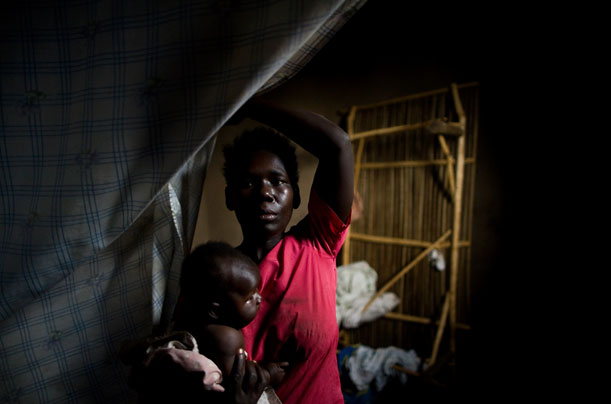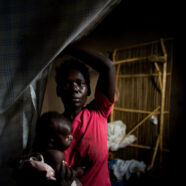Is demand for organic cotton contributing to malaria in Africa?

Photo courtesy of Getty Images for Time - Betty Edjan of Apac tries to protect her baby with a sheet, desperate for the insecticide-treated net that could save her child's life.
In the US, we all believe that we are making the socially responsible choice by purchasing organic cotton. However, how often do we think about the negative consequences that our green lifestyles could potentially cause? In Africa, malaria is affecting millions, and the western hunger for organic cotton may be the cause.
Malaria is an infectious disease that is mosquito-borne and more common in subtropical conditions. In 2008, it killed 863,000 individuals with 88% of the casualties being children under five, and infected 243 million more. Although it affects half of the world’s countries, Africa accounts for more than two thirds of the cases.
In Apac, a town in the swamplands of Uganda, nearly 25% of the 500,000 residents have been treated for malaria, with much of the adult population experiencing the mental retardation effects that were caused by the illness that they contracted when they were babies. The average inhabitant in Apac is bitten tens of thousands of times a year by insects, and 1,586 times per year (four times per day) by mosquitos carrying Malaria. “That meant 2,000 to 3,000 patients a week for Dr. Matthew and his three fellow doctors, and the number rose to 5,000 in the rainy season. Of Apac’s malaria patients, nearly half were under five,” reports Alex Perry of Time.
Malaria has killed tens of millions since its first outbreak in the mid-19th century. In the 1950s and 60s, technology virtually eliminated the disease in the US and Europe, but did little to eradicate the issue in Africa and Asia, with health officials claiming that those places couldn’t be helped by the campaign with the limited funding.
Malaria funding today has risen to over $10 billion dollars, with supporters such as Obama, the Sultan of Nigeria, and even celebrity athlete David Beckham. The solution that many groups are suggesting is very clear: distribute the 700 million needed bed nets treated with insecticide, which would result in no more malaria-related deaths in just five years, and elimination of the disease within two decades.
With the funding and the answer to the problem sitting in front of the world, many might ask why nothing is being done. Pressure from the National Wetlands Program (funded by Belgium), forbidding the draining of malarial swamps, is preserving wetlands at the price of 500,000 children’s lives annually. Additionally, Uganda’s organic cotton farmers object to the insecticide-treated nets, banking on the business relationships they have in the West with Walmart, Nike and H&M.
Even though elimination of malaria in Africa would boost economic growth, as well as the country’s health remarkably (the disease costs the country about $12 billion dollars per year), African business owners that are selling to American organic clothing companies are too stuck in short-term goals to support the much needed change.
In the US, the organic cotton craze has been growing consistently. As more and more people learn about living green, the demand for sustainable products grows. Many companies are using “green” branding because they know it will achieve high sales. The goals of ethical consumption get lost among balance sheets, marketing ploys and sales pitches of companies that don’t truly have the end in mind.
Is wearing organic cotton in the US more important that improving basic living conditions in Africa? What green choices are you willing to support at all costs? Many sustainable advocates should question their ethical consumption practices; is living green worth the price of human life?
What you can do
- Research products and companies that you support and their business practices
- Donate to Malaria No More, a non-profit organization determined to end the cycle of malaria related death in poverty stricken countries
- Think critically about the effects of your living green choices – the world is an eco system, which means that trying to help can sometimes cause more damage than the seemingly less-sustainable alternative
